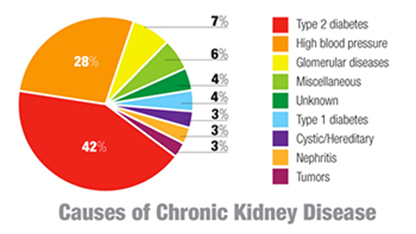
3. Many Patients Show Signs of Chronic Kidney |

![]() Many patients who will later be diagnosed with diabetes show signs of chronic kidney disease (CKD) even before their diabetes diagnosis, according to a new study, published in the journal PLoS One.
Many patients who will later be diagnosed with diabetes show signs of chronic kidney disease (CKD) even before their diabetes diagnosis, according to a new study, published in the journal PLoS One.
![]() The researchers looked at the data, from electronic health records of the United States Department of Veterans Affairs, of 36,764 US veterans who were diagnosed with diabetes between 2003 and 2013. Based on the estimated glomerular filtration rate (eGFR) and urine-albumin-creatine ratios, two common measures of kidney function, it was found that 31.6% of these individuals had evident CKD even prior to being diagnosed with diabetes (over half of whom had at least moderate kidney disease i.e. stage 3 or higher).
The researchers looked at the data, from electronic health records of the United States Department of Veterans Affairs, of 36,764 US veterans who were diagnosed with diabetes between 2003 and 2013. Based on the estimated glomerular filtration rate (eGFR) and urine-albumin-creatine ratios, two common measures of kidney function, it was found that 31.6% of these individuals had evident CKD even prior to being diagnosed with diabetes (over half of whom had at least moderate kidney disease i.e. stage 3 or higher).
![]() Veterans with higher age, hemoglobin A1C, blood pressure, and body mass index (BMI) also had a greater risk of CKD. All of these factors are themselves risk factors for diabetes. Those with cerebrovascular disease, congestive heart failure, or peripheral artery disease -- conditions that are frequently seen alongside diabetes -- had higher kidney disease risk as well. The study also revealed disparities in the rates of CKD based on race. Asian Americans and African Americans had higher rates of chronic kidney disease than whites. However, the proportion of patients who were minorities decreased as disease severity increased.
Veterans with higher age, hemoglobin A1C, blood pressure, and body mass index (BMI) also had a greater risk of CKD. All of these factors are themselves risk factors for diabetes. Those with cerebrovascular disease, congestive heart failure, or peripheral artery disease -- conditions that are frequently seen alongside diabetes -- had higher kidney disease risk as well. The study also revealed disparities in the rates of CKD based on race. Asian Americans and African Americans had higher rates of chronic kidney disease than whites. However, the proportion of patients who were minorities decreased as disease severity increased.
![]() "While CKD is silent, it can also lead to a higher risk of various complications such as high blood pressure, cardiovascular disease, and death. Early recognition of CKD can help implement measures that can delay its progression and is thus very important. While there are no cures for established CKD, a healthy lifestyle, good blood pressure and diabetes control, and avoidance of various harmful exposures, such as over-the-counter painkillers, can help delay CKD's progression". Says the co-author of the study, Dr. Csaba Kovesdy from Memphis VA Medical Center, USA.
"While CKD is silent, it can also lead to a higher risk of various complications such as high blood pressure, cardiovascular disease, and death. Early recognition of CKD can help implement measures that can delay its progression and is thus very important. While there are no cures for established CKD, a healthy lifestyle, good blood pressure and diabetes control, and avoidance of various harmful exposures, such as over-the-counter painkillers, can help delay CKD's progression". Says the co-author of the study, Dr. Csaba Kovesdy from Memphis VA Medical Center, USA.
![]() The results thus highlight an opportunity for broadening the screening among patients with increased risk of CKD. More screening of at-risk populations could lead to earlier identification of diabetes, which could, in turn, prevent organ damage. "Better awareness of the risk factors for CKD -- for example, high blood pressure, obesity, cardiovascular disease, race-ethnicity, family history -- is needed for health care providers to become proactive about screening for early-stage CKD" Kovesdy adds.
The results thus highlight an opportunity for broadening the screening among patients with increased risk of CKD. More screening of at-risk populations could lead to earlier identification of diabetes, which could, in turn, prevent organ damage. "Better awareness of the risk factors for CKD -- for example, high blood pressure, obesity, cardiovascular disease, race-ethnicity, family history -- is needed for health care providers to become proactive about screening for early-stage CKD" Kovesdy adds.
For enquiries info@jothydev.net.
Please visit: jothydev.net | research.jothydev.com | diabscreenkerala.net | jothydev.com/newsletter
